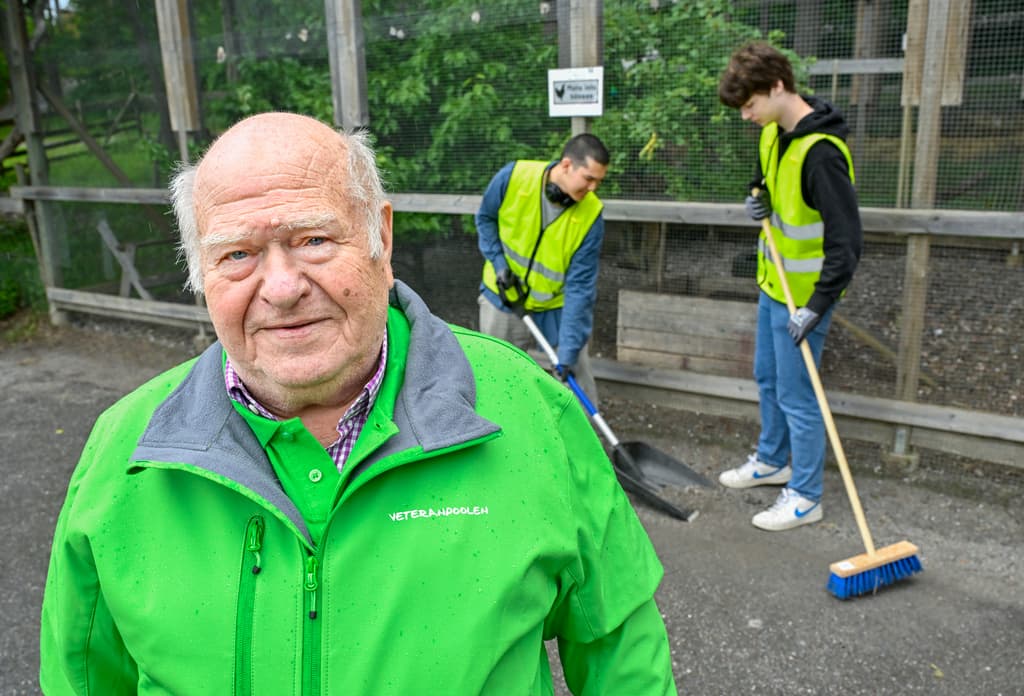More than a quarter of a million Swedes continue to work – despite being pensioners. In addition to getting more money, the pensioners also see other values in staying in working life.
You can't just sit around, says 76-year-old Jakob Goldberg, who is working full-time this summer.
The future workforce meets yesterday's, in a playground in Hässelby in western Stockholm. Jakob Goldberg was previously an IT manager. Now he is summer-working via the company Veteranpoolen, and is leading a group of teenagers who take care of green areas and asphalt.
It's about staying active. It's nice, it's fun – especially in the summer. The last two years I've had fantastic weather. Then I got really tanned, he says.
Goldberg started working almost immediately after retirement with small part-time jobs. The only longer break was when the pandemic struck.
It was a nightmare to just sit at home. So this is worth a lot. And working with young people – then you become young again.
There are 261,000 pensioners in the country, i.e., people who continue to work while receiving their pension. The phenomenon has become increasingly common.
In the past, pensioners became old early. But that's not the case anymore. I don't feel like I'm 76. I feel like I'm 55, says Goldberg.
Most pensioners are 65-66 years old. Every fifth continues to work five years after retirement.
About 2,300 pensioners are 85 years or older, says Monica Zettervall, pension expert at the Pensions Authority.
There are many thousands of kronor to be saved, both in salary and in higher pension.
If the alternative is to retire completely, it's always more beneficial to continue working to some extent, since you then continue to earn money for your pension and also receive a work income, says Zettervall.
Goldberg, however, downplays the economic aspect for himself. And Isabelle Hansson, a doctor of psychology at the University of Gothenburg, says that only every fifth pensioner works for economic reasons.
What we've seen in our studies is that personal drivers, such as the work feeling meaningful, are important, she says.
Other reasons are feeling needed and social contact with others. Work is a large and important part of our lives, and continuing to work means that you maintain structures and social relationships, according to her.
For most people, I would say that it's beneficial to continue working. And the fact that most people work part-time also enables a more gradual adaptation to life as a pensioner, she says.
+ Higher job tax deductions and basic deductions from the year you turn 67 mean that tax on salary and pension becomes lower.
+ From the 67th year of life, the employer's contribution decreases from 31.4 to 10.21 percent.
+ You can take out 25, 50, 75, or 100 percent of your income and premium pension, regardless of what you earn. The withdrawals can also be paused and changed. For occupational pensions, different rules apply, check them out beforehand.
+ Be careful that pension and salary together do not exceed the threshold for state tax of 51,275 kronor (for people from 67 years, the limit is 58,100 kronor), then you may have to pay unnecessarily high taxes.
+ A person with 34,000 kronor in salary who works half-time from 63 to 66 years of age and simultaneously takes out half of their public pension earns around 2,000 kronor more per month in pension, compared to retiring completely at 63 years of age. Until the age of 86, that means a total of half a million kronor more after tax.






